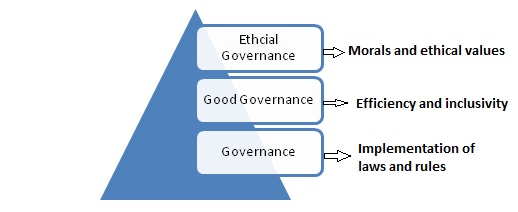- Filter By :
- Theoretical Questions
- Case Studies
-
Q. What do you understand by ethical governance and examine how is it different from good governance? (150 words)
03 Oct, 2019 GS Paper 4 Theoretical QuestionsApproach
- Define good governance and ethical governance with examples.
- Make a comparative analysis of both.
Answer
- Good governance refers to streamlining the implementation of policies and programmes in an efficient and inclusive manner while addressing the grievances of people effectively.
- For example, proper implementation of RTI provisions enabled citizens’ access to public information with ease.
- Use of e-governance applications to remove red-tapism and enhanced transparency and efficiency, simultaneously reducing corruption and nepotism.
- Ethical governance is a way of governing which infuses high standards of moral values and behaviour in governance process.
- For example, a bureaucrat is bound to serve the people that come to his office, but he couldn't be penalized if he doesn't make provisions for a glass of water to an elderly couple who might be tired after waiting too long in the queue. Those will be the ethics of public service and altruism that will make him do that.
- Similarly, an official should allow disbursal of PDS ration to beneficiaries particularly for women and senior citizens, even if there is a failure of Aadhaar identification due to mismatch of biometric data. It is important to understand that denial of such services may cost a person his life. Hence, compassion and human dignity forms the basis of ethical governance.
Thus, good governance and ethical governance are not dichotomous rather the former forms the foundation stone for the latter. Ethical governance is the much needed approach for establishing trust and mutual cooperation between citizens and public servants.
To get PDF version, Please click on "Print PDF" button.
Print PDF





